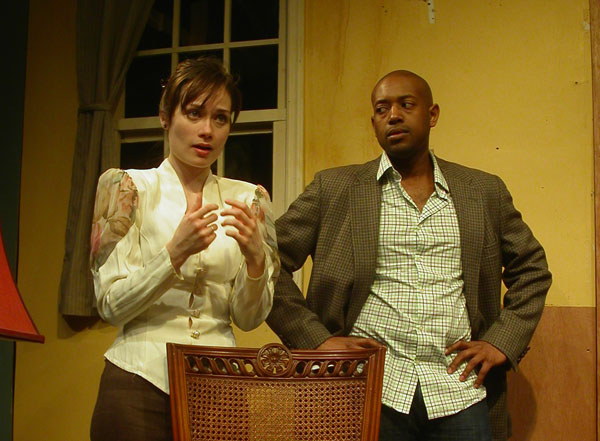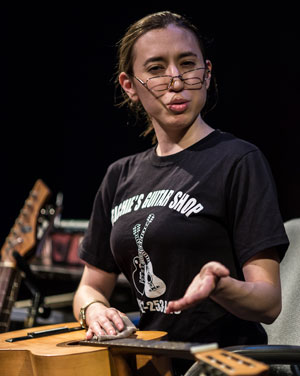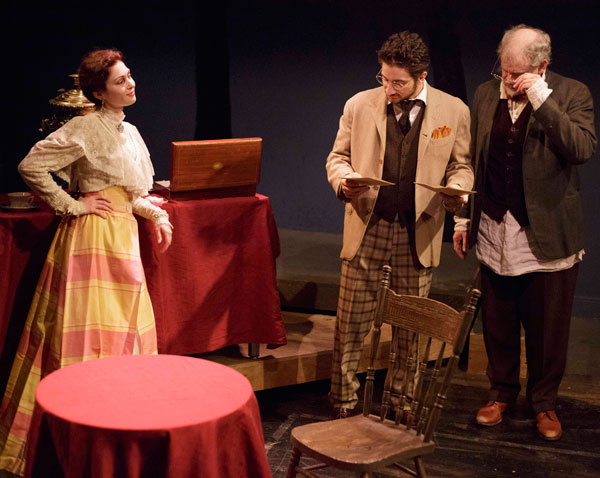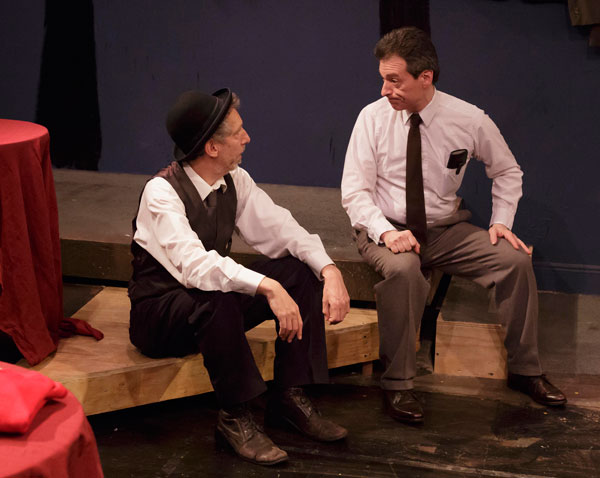
From “Alive and Well,” by Mercedes Segesvary: Natalie Newman and Hakim Rashad McMillan.
Annual fest chronicles neighborhood life, lore

BY SCOTT STIFFLER | Documenting the evolution of its surrounding neighborhood through fiction based on historical facts as well as word-for-word fidelity to those living in the here and now, Metropolitan Playhouse’s East Village Theater Festival mines those perspectives as a way to shed light on art, activism, immigration and gentrification.
This year’s festival, the fourth in an annual celebration of area life and lore, covers everything from 1898 suffragettes rattling the gates of the Stuyvesant Chess Club to Lower East Side tenement life to a morning-after tango of socio-sexual politics (negotiated by a Wall Street broker and his casual fling, as Occupy protesters fill the streets below).
That’s just for starters, in terms of what’s on the plate of “East Village Chronicles” — eight new plays equally divided between the themes of “Pioneers” and “Game Changers.” Six new solo performances are also on this year’s bill, the latest installment of Metropolitan’s “Alphabet City” project.
A time capsule in the form of oral histories, “Alphabet City” is a collection of solo performances written by their performers and culled, verbatim, from first-person interviews with local residents. The series (which, like “Chronicles,” will reach the decade mark next year) has already featured the life stories of over 50 artists, advocates, entrepreneurs, street figures, drug dealers and care-givers. Hilly Christal of CBGBs and “Mosaic Man” Jim Power are among its better-known participants — but like the work of the late Chicago-based Studs Terkel, a greater portion of the “Alphabet City” recipe comes from those who’ve spent decades living and working in the East Village without having their contributions publicly acknowledged.
Terkel (whose “Working” is of particular relevance to the “Alphabet City” aesthetic) is always worth a read for his sweeping, in-their-own-words canvas of race, class and political concerns — but Metropolitan Playhouse does him one better, by bringing the transcribed recollections of its participants to life. This being theater, though, the real lives portrayed on the stage may not necessarily bear a precise resemblance to their originators.
“Every time there is a distance between the portrayer and the portrayed,” says Metropolitan Playhouse Artistic Director Alex Roe, “it really opens space for we in the audience to see the essence of the person, and not be so distracted by what we assume from their appearance. The farther apart they are in age, race and gender,” he says of the purposefully great divide between real life subject and theatrical counterpart, “the more you get a sense of the spirit of the individual. Emily Grosland is the actress playing Michael Schupbach, who’s a puppeteer. They both effervescent people, and that’s what you see. But since you’re watching a young woman play a man, what you get is that spiritual, bright enthusiasm for life, because that’s what’s common to them. At the same time, you’re reminded you’re not just looking at a Doppelgänger, because this is a common thing we all share.”

Sara Antkowiak, Paul Bomba, and James Luse in the 2012 production of Matthew Kelly’s “Russian Tea.”
Roe says the festival puts equal emphasis on first-person accounts of East Village life because its snapshot nature “is not a playwright’s clever take on history. It’s revelatory and surprising, in the same way that you run across a beautiful moment in the street — the way the sunlight hits a building, or an interchange you overhear between two people.”
That said, Roe notes that the plays comprising their “East Village Chronicles” represent the “joy in seeing a structured story told,” particularly when it’s the work of a playwright far removed from where the action takes place. San Francisco-based Mercedes Segesvary, for example, contributed “Alive and Well,” about a Downtown biracial couple whose apartment is robbed.
“Fiction,” says Roe, “allows us to interact with our world in important way, by stepping back from the surfaces of the truth. Storytelling is a great way of not just reporting the world, but helping to interpret it. To me, I’m always interested in the benefit we get from distance, the perspective. What we try to do with this festival is not just celebrate and enjoy the neighborhood, but also introduce people to its past and current concerns. Among those are cultural or class conflicts. One of the plays [Segesvary’s “Alive and Well”] takes place after a power outage.”
Although Sandy isn’t mentioned by name, Roe speculates at little risk that last October’s hurricane and its aftermath will be front and center on the audience’s mind — as the plays asks very pointed questions about “how strong our social ties are when we’re confronted with the challenges of a natural disaster.”
Josh Gulotta’s “Occupy Avenue A,” says Roe, “asks questions about power dynamics, not just that of new lovers, but also as it relates to the Occupy movement and protests generally — which has always been a particular concern of this neighborhood.”

Jerry Goralnick and John Blaylock in the 2012 production of “Willow Grove,” by Isidore Elias.
Before these and other meaty issues show up on the boards, the East Village Theater Festival kicks off with an April 15 reception and panel discussion about the area’s contemporary challenges. On the day we spoke with Roe, he had just returned from a meeting where members of a now-forming Lower East Side long-term recovery Group were in dialogue with FEMA, New York Cares, The Red Cross and “many local organizations, all of whom were there to talk about meeting social needs and disaster preparedness. I was there to mention we’re kicking off this festival. So everybody in that room, in their own way, was concerned about the future needs of the East Village. I hope some of them will be willing to join the panel. To think that our theatricalizing of the neighborhood could invite dialogue between performers, community groups and audiences excites me. I want to bring real people together to engage in real dialogue, to use our theater as a forum for conversation about, and preparation for, what the future holds.”
THE EAST VILLAGE THEATER FESTIVAL
14 NEW WORKS INSPIRED BY LIFE IN THE EAST VILLAGE
April 15-May 5
Mon.-Sun. at 7pm
Sat./Sun. at 1pm & 4pm
At Metropolitan Playhouse
220 E. Fourth St. (btw. Aves. A & B)
Tickets: $20 ($15 for students/seniors, $10 for under 18)
$50 for all four programs
Call 800-838-3006 or visit metropolitanplayhouse.org
































